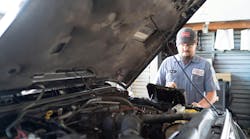VehicleServicePros.com recently reported that the U.S. Department of Labor projects there will be more than 1.2 million jobs in the collision, automotive, motorcycle and marine industries in the next five years, and there will be a lack of qualified automotive and diesel technicians.
The automotive industry is at the crest of a nationwide challenge known as the "skills gap." While the nation continues to suffer high unemployment, many employers cannot find qualified workers for well-paying jobs because not enough people are trained for them. The problem is compounded by the fact that the education system has not caught up with new economic realities, the work itself is largely seen as "uncool," and many white collar positions still do pay better than jobs that require getting your hands dirty.
While good jobs go unfilled and unemployment remains high, hundreds of thousands of young people are stuck with education debts they may never repay. Those who find jobs often end up in low-paying service positions with little future.
The problem has been years in the making. It is complex and there is no fast solution.
Not everyone believes the "skills gap" is real. Some point to the fact that information technology jobs such as software engineering offer better compensation than jobs traditionally viewed as blue collar, such as automotive service.
Neither side in this debate is completely right or wrong, and that's part of the problem.
Gary Beach, former publisher of Computerworld, Network World and CIO Magazine, hit the nail on the head in his new book, "The U.S. Technology Skills Gap: What Every Technology Executive Must Know to save America's Future," published by John Wiley & Sons. Beach notes that in addition to stronger math and science skills, better training is also needed in the "5Cs" – critical thinking, communication, collaboration, creativity and confidence. Success in the 21st Century, he claims, requires this broad mix of skills.
Where many in both the private and public sectors call for improved technical training, Beach notes that more attention is needed on the education system itself.
Beach says it's important for public policymakers to increase teacher salaries. He suggests the creation of state education trust funds modeled after the "Highway Trust Fund" in the 1950s that financed the construction of the interstate highway system with a gasoline tax.
I mention Beach not because I think he has all the answers. But being both an academic and a businessman, Beach has given the challenge the attention it needs and demonstrates the creative thinking that will provide solutions. He is not alone.
Mike Rowe, host of the Discovery Channel's "Dirty Jobs" TV show, has become one of the most visible proponents of addressing the "skills gap" challenge. During a recent TV interview, Rowe noted that while 12 million Americans are out of work, 3 million jobs remain unfilled due to lack of qualified workers. Rowe recently noted that a Caterpillar dealership in Las Vegas has been unable to fill 26 technician openings that pay $40,000-plus starting salaries and potential for six figure salaries.
The "skills gap" is real, and no one in the automotive aftermarket questions it. But aftermarket members also need to commit themselves to solutions.
The technology that has changed automobiles and many other aspects of our daily existence has created a demand for new skills. And in addressing that demand, our education system has made progress, but it has also lost sight of some of the basic skills that are still needed.
Those of us working in the automotive field know that information technology is merging with automotive repair, given the computerization of automobiles. Hence, vocational emphasis on information technology skills makes sense and it addresses much of the automotive aftermarket's labor challenge. But the auto repair industry needs to improve its visibility in technology training curriculums.
Organizations exist for individuals and companies interested in doing their part to address the problem, such as Mike Rowe's Profoundly Disconnected (www.profoundlydisconnected.com), SkillsUSA (www.skillsusa.org) and the Association for Career & Technical Education (www.acteonline.org).
The skills gap is real, and it challenges the automotive aftermarket.


